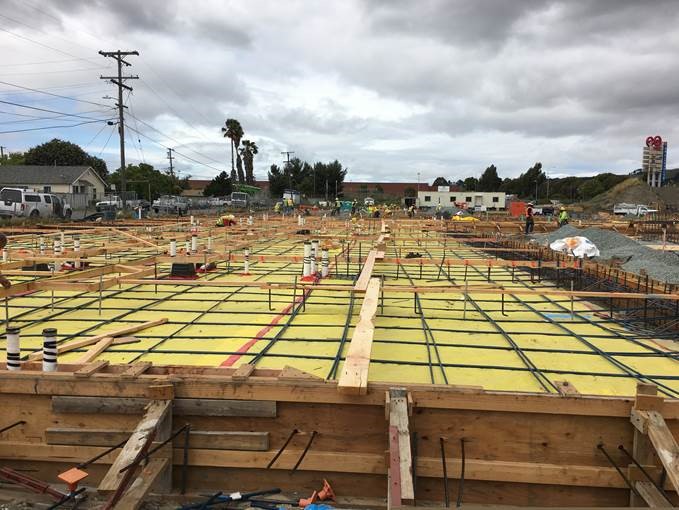City Government
Open Letter: Support the Right of African Americans to Work on City-funded Construction Projects

- The City should not sell any more public land before discussion and adoption of a policy.
- The city’s land should not be used for housing affluent non-residents. It should house current residents of Oakland who are mostly low- or middle-income, or it should be used to serve the needs of those communities.
- The City should not adopt a Project Labor Agreement (PLA) in a resolution on Public Lands Policy.
Many Oakland residents have never heard of a PLA. Even the title of the item on the City Council committee agenda which proposes a PLA does not mention that it is being discussed “Subject: Receive A Report on the Public Lands Policy Process and Analysis from Councilmembers Guillén And Kaplan”
Residents of the city have a right to a detailed, open, well-publicized discussion of proposals about how the expanding amounts of work that their taxes are paying for are being awarded.
African-Americans obtain only nine percent of the work on city-funded construction projects (City of Oakland statistics). African-Americans are 25 percent of the city’s population and the largest percentage of the unemployed and unhoused both nationally and locally. A project labor agreement could contribute to maintaining that status quo.
What the City Council Should do Instead:
- Immediately enact the ordinance establishing a 180-day moratorium on the sale of public land or until the Council adopts a comprehensive “Public Lands” Policy. A properly vetted public lands policy will take time. Harmful sales of public land cannot be allowed in the meantime.
- Separate the discussion of jobs policies and lands policy and organize a transparent, understandable, democratic discussion of each. The Department of Race and Equity should be asked for an equity assessment of proposals
Among items that could be part of a thorough jobs policy discussion:
- Discuss the differences between a PLA and a public city-adopted jobs policy;
- Remove discriminatory barriers that result in only 9 percent African-American employment in construction;
- Prioritize employment of disadvantaged workers;
- Protect the union rights of employees;
- Fund job-training and apprenticeship programs that are geographically accessible to Oakland residents;
- Living wage requirements;
- Employ at least 50 percent local Oakland residents;
- Ban the box to assist the employment of formerly incarcerated;
- Require a twice-yearly report to Council including trade-by-trade demographic statistics;
- Increase funding for contract compliance to reflect the expanded work being required by new construction;
- Incentivize contracting with women and “minority” owned business and other provisions.
Respectfully submitted,
- OaklandWORKS Alliance (Founding organizations include the West Oakland Environmental Indicators Project (WOEIP), Black Women Organized for Political Action (BWOPA); Oakland Parents Together (OPT); John George Democratic Club; Oakland Branch NAACP; Oakland Native Give Back).
- Brian Beveridge, Co-Director, West Oakland Environmental Indicators Project
- Gay Plair Cobb, Member, BWOPA State Board; Executive Board member, NAACP
Henry Hitz, Oakland Parents Together - Robyn Hodges, OaklandWORKS
- Pastor Anthony Jenkins, Taylor Memorial United Methodist Church
- Kimberly Mayfield Lynch, Dean of the School of Education, Holy Names University
- Kitty Kelly Epstein, Professor; Community Assembly of the Post Salon, Host of Education Today on KPFA
- James Vann, Co-Founder, Oakland Tenants Union and member of the Community Assembly of the Post Salon
(Partial list. Titles for identification only)
Activism
Oakland Post: Week of December 24 – 30, 2025
The printed Weekly Edition of the Oakland Post: Week of – December 24 – 30, 2025

To enlarge your view of this issue, use the slider, magnifying glass icon or full page icon in the lower right corner of the browser window.
Alameda County
Oakland Council Expands Citywide Security Cameras Despite Major Opposition
In a 7-1 vote in favor of the contract, with only District 3 Councilmember Carroll Fife voting no, the Council agreed to maintain its existing network of 291 cameras and add 40 new “pan-tilt-zoom cameras.”

By Post Staff
The Oakland City Council this week approved a $2.25 million contract with Flock Safety for a mass surveillance network of hundreds of security cameras to track vehicles in the city.
In a 7-1 vote in favor of the contract, with only District 3 Councilmember Carroll Fife voting no, the Council agreed to maintain its existing network of 291 cameras and add 40 new “pan-tilt-zoom cameras.”
In recent weeks hundreds of local residents have spoken against the camera system, raising concerns that data will be shared with immigration authorities and other federal agencies at a time when mass surveillance is growing across the country with little regard for individual rights.
The Flock network, supported by the Oakland Police Department, has the backing of residents and councilmembers who see it as an important tool to protect public safety.
“This system makes the Department more efficient as it allows for information related to disruptive/violent criminal activities to be captured … and allows for precise and focused enforcement,” OPD wrote in its proposal to City Council.
According to OPD, police made 232 arrests using data from Flock cameras between July 2024 and November of this year.
Based on the data, police say they recovered 68 guns, and utilizing the countywide system, they have found 1,100 stolen vehicles.
However, Flock’s cameras cast a wide net. The company’s cameras in Oakland last month captured license plate numbers and other information from about 1.4 million vehicles.
Speaking at Tuesday’s Council meeting, Fife was critical of her colleagues for signing a contract with a company that has been in the national spotlight for sharing data with federal agencies.
Flock’s cameras – which are automated license plate readers – have been used in tracking people who have had abortions, monitoring protesters, and aiding in deportation roundups.
“I don’t know how we get up and have several press conferences talking about how we are supportive of a sanctuary city status but then use a vendor that has been shown to have a direct relationship with (the U.S.) Border Control,” she said. “It doesn’t make sense to me.”
Several councilmembers who voted in favor of the contract said they supported the deal as long as some safeguards were written into the Council’s resolution.
“We’re not aiming for perfection,” said District 1 Councilmember Zac Unger. “This is not Orwellian facial recognition technology — that’s prohibited in Oakland. The road forward here is to add as many amendments as we can.”
Amendments passed by the Council prohibit OPD from sharing camera data with any other agencies for the purpose of “criminalizing reproductive or gender affirming healthcare” or for federal immigration enforcement. California state law also prohibits the sharing of license plate reader data with the federal government, and because Oakland’s sanctuary city status, OPD is not allowed to cooperate with immigration authorities.
A former member of Oakland’s Privacy Advisory Commission has sued OPD, alleging that it has violated its own rules around data sharing.
So far, OPD has shared Flock data with 50 other law enforcement agencies.
Activism
Black Arts Movement Business District Named New Cultural District in California
Located in the heart of District 3, the BAMBD is widely regarded as one of the nation’s most important centers of Black cultural production — a space where artists, entrepreneurs, organizers, and cultural workers have shaped generations of local and national identity. The state’s recognition affirms the district’s historic importance and its future promise.

By Post Staff
Oakland’s Black Arts Movement Business District (BAMBD) has been selected as one of California’s 10 new state-designated Cultural Districts, a distinction awarded by the California Arts Council (CAC), according to a media statement released by Councilmember Carroll Fife.
The BAMBD now joins 23 other districts across the state recognized for their deep cultural legacy, artistic excellence, and contributions to California’s creative economy.
Located in the heart of District 3, the BAMBD is widely regarded as one of the nation’s most important centers of Black cultural production — a space where artists, entrepreneurs, organizers, and cultural workers have shaped generations of local and national identity. The state’s recognition affirms the district’s historic importance and its future promise.
“This designation is a testament to what Black Oakland has built — and what we continue to build when we insist on investing in our own cultural and economic power,” said Fife.
“For years, our community has fought for meaningful recognition and resources for the Black Arts Movement Business District,” she said. “This announcement validates that work and ensures that BAMBD receives the support it needs to grow, thrive, and continue shaping the cultural fabric of California.”
Since taking office, Fife has led and supported multiple initiatives that strengthened the groundwork for this achievement, including:
- Restoring and protecting arts and cultural staffing within the City of Oakland.
- Creating the West Oakland Community Fund to reinvest in historically excluded communities
- Advancing a Black New Deal study to expand economic opportunity for Black Oakland
- Ensuring racial equity impact analyses for development proposals, improving access for Black businesses and Black contractors
- Introduced legislation and budget amendments that formalized, protected, and expanded the BAMBD
“These efforts weren’t abstract,” Fife said. “They were intentional, coordinated, and rooted in a belief that Black arts and Black businesses deserve deep, sustained public investment.”
As part of the Cultural District designation, BAMBD will receive:
- $10,000 over two years
- Dedicated technical assistance
- Statewide marketing and branding support
- Official designation from Jan. 1, 2026, through Dec. 31, 2030
This support will elevate the visibility of BAMBD’s artists, cultural organizations, small businesses, and legacy institutions, while helping attract new investment to the district.
“The BAMBD has always been more than a district,” Fife continued. “This recognition by the State of California gives us another tool in the fight to preserve Black culture, build Black economic power, and protect the families and institutions that make Oakland strong.”
For questions, contact Councilmember Carroll Fife at CFife@oaklandca.gov.
-

 #NNPA BlackPress4 weeks ago
#NNPA BlackPress4 weeks agoLIHEAP Funds Released After Weeks of Delay as States and the District Rush to Protect Households from the Cold
-

 Alameda County4 weeks ago
Alameda County4 weeks agoSeth Curry Makes Impressive Debut with the Golden State Warriors
-

 #NNPA BlackPress4 weeks ago
#NNPA BlackPress4 weeks agoSeven Steps to Help Your Child Build Meaningful Connections
-

 #NNPA BlackPress4 weeks ago
#NNPA BlackPress4 weeks agoSeven Steps to Help Your Child Build Meaningful Connections
-

 #NNPA BlackPress4 weeks ago
#NNPA BlackPress4 weeks agoTrinidad and Tobago – Prime Minister Confirms U.S. Marines Working on Tobago Radar System
-

 #NNPA BlackPress4 weeks ago
#NNPA BlackPress4 weeks agoThanksgiving Celebrated Across the Tri-State
-

 #NNPA BlackPress4 weeks ago
#NNPA BlackPress4 weeks agoTeens Reject Today’s News as Trump Intensifies His Assault on the Press
-

 #NNPA BlackPress4 weeks ago
#NNPA BlackPress4 weeks agoBreaking the Silence: Black Veterans Speak Out on PTSD and the Path to Recovery























































